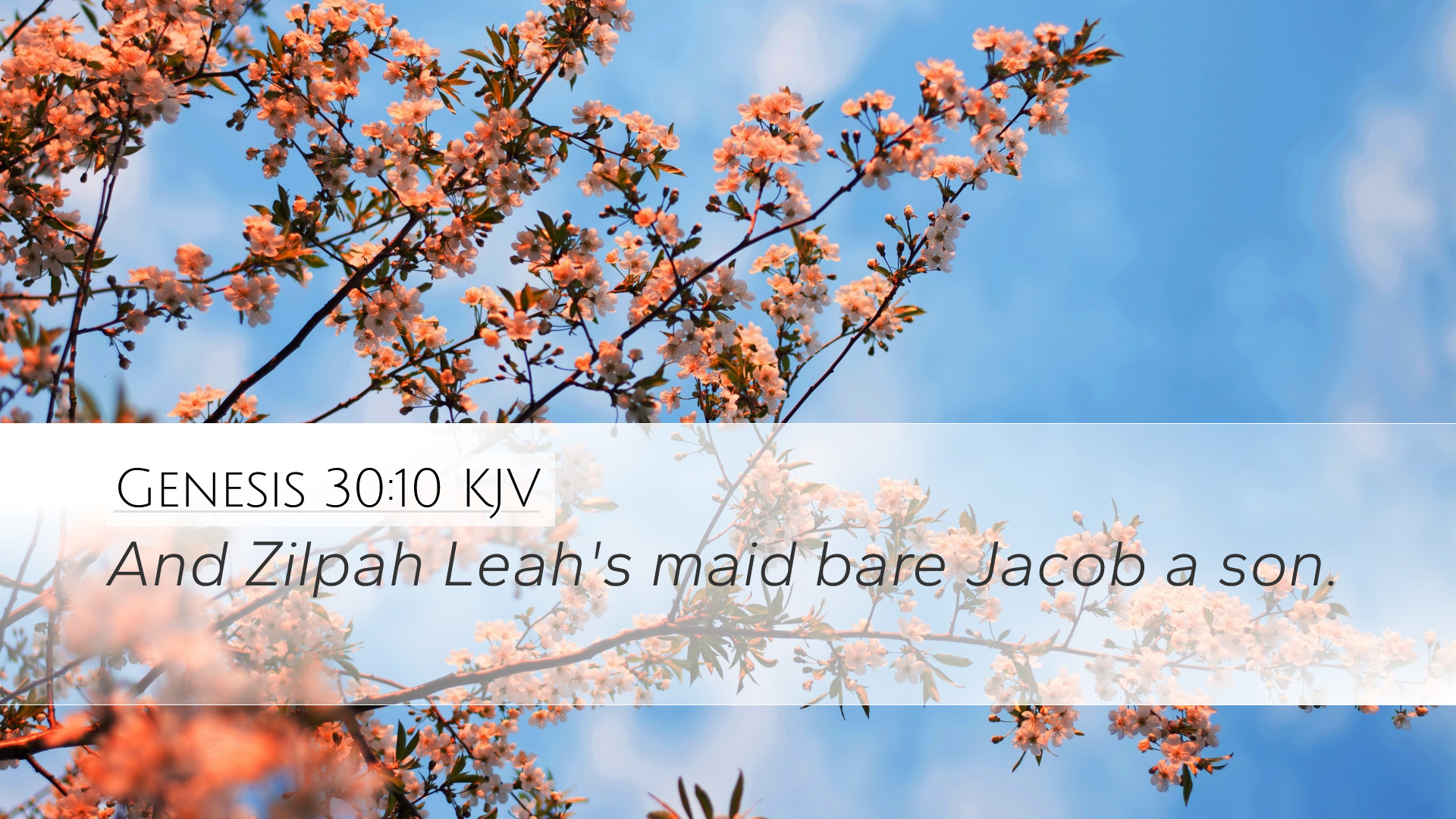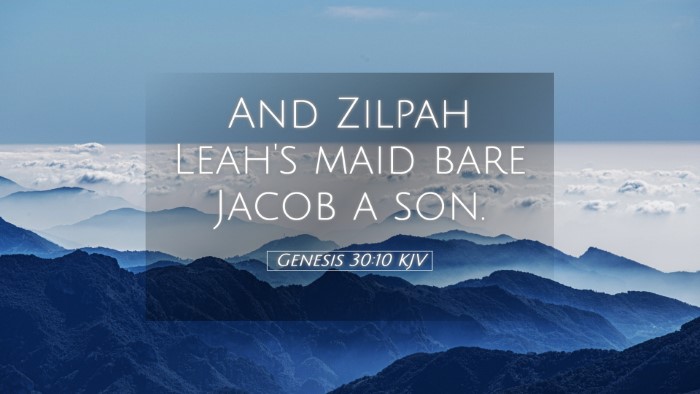Commentary on Genesis 30:10
This verse states: "And Leah's maid Zilpah bore Jacob a son." This passage, while simple in its presentation, opens the door to profound discussions on familial relationships, societal norms, and God's providential work.
Overview of Context
The immediate context of Genesis 30 illustrates a complex web of family dynamics within Jacob's household. Jacob, having married Leah and Rachel, finds himself amidst rivalry as these sisters vie for his love and for the legacy of their children. This narrative is a critical examination of the human condition, particularly in terms of desire, competition, and the quest for identity through offspring.
Historical Background
The custom of using handmaids to bear children for a husband stems from ancient Near Eastern culture, reflecting deep-seated views on lineage and inheritance. Leah’s action is not only a response to her emotional plight but also indicative of the challenges faced by women in a patriarchal society.
Insights from Public Domain Commentaries
Matthew Henry
Matthew Henry provides rich reflections on this verse, emphasizing the significance of Zilpah's role as a maid and the broader implications of her bearing a child. He notes that this act represents human effort to fulfill divine promises—it is a reminder that God’s purposes may manifest through human actions, albeit often fraught with complications. Leah's intent, in yielding her maid to Jacob, reflects her desperation and desire for recognition within the family structure.
Albert Barnes
Albert Barnes expounds on the importance of the familial relationships in this passage. He highlights Zilpah's son as part of the broader narrative concerning the fulfillment of God's covenant with Jacob. The birth of this child serves as an indicator of God's faithfulness, even amidst the turmoil of human decisions and rivalries. Barnes posits that God can bring about His divine will through the imperfections and struggles present in human affairs.
Adam Clarke
Adam Clarke focuses on the character of Zilpah and the title of her son, which symbolizes a transition in Leah's strategy to gain Jacob's affections. Clarke notes that the naming of children in biblical times often carries profound meaning. Thus, the birth of Zilpah's child is emblematic of Leah's ongoing struggle for love and acceptance, and indirectly reveals God's involvement in her life. Clarke also emphasizes the sociological implications of such practices—where power dynamics and personal worth can shift based on progeny.
Theological Reflections
This passage can serve several theological reflections:
- The Nature of Divine Providence: The human frailty depicted in Leah's dealings with Zilpah and Jacob underlines the reality of divine providence working through human choices. God uses imperfect means to accomplish His purposes, which invites a deeper understanding of grace and redemption.
- Identity and Value: This story challenges contemporary notions of identity and value derived from social standing and familial accomplishments. Leah’s longing for sons indicates a deeper existential struggle for worth that resonates with many today, reminding pastors and theologians of the intrinsic value found in being beloved by God rather than by societal standards.
- The Complexity of Relationships: The rivalry between Leah and Rachel speaks to the complex nature of human relationships, especially within families. It raises questions about love, jealousy, and companionship that are relevant for pastoral care and counseling.
Application for Pastors and Scholars
For pastors, the story of Leah and Zilpah provides a rich resource for sermons on grace, identity, and the nature of God's providence. It invites discussions on how to navigate the complexities of human relationships while maintaining faith in divine sovereignty. The challenges faced by these women also provide a framework for empathizing with modern issues regarding worth, identity, and interpersonal strife.
For scholars, the socio-historical context offers fertile ground for exploration into the roles of women in ancient Near Eastern societies and how their experiences shape theological discussions today. The narrative challenges scholars to read this text not only as a historical account but also as a living document revealing profound truths about God’s engagement with humanity.
Conclusion
Genesis 30:10, though seemingly a mere account of childbirth, encapsulates deep theological, familial, and societal themes that continue to resonate today. Through the perspectives of Matthew Henry, Albert Barnes, and Adam Clarke, readers are encouraged to engage with the text critically and reflectively, drawing meaningful applications for faith and life.


